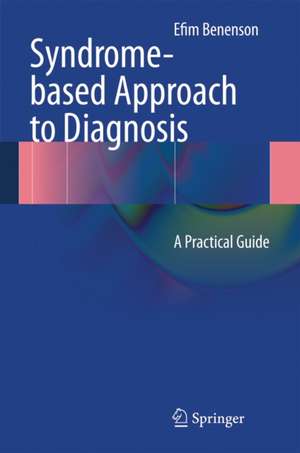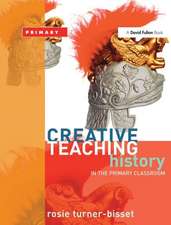Syndrome-based Approach to Diagnosis: A Practical Guide
Autor Efim Benensonen Limba Engleză Hardback – 19 mar 2013
| Toate formatele și edițiile | Preț | Express |
|---|---|---|
| Paperback (1) | 832.94 lei 6-8 săpt. | |
| SPRINGER LONDON – 12 apr 2015 | 832.94 lei 6-8 săpt. | |
| Hardback (1) | 713.54 lei 6-8 săpt. | |
| SPRINGER LONDON – 19 mar 2013 | 713.54 lei 6-8 săpt. |
Preț: 713.54 lei
Preț vechi: 751.10 lei
-5% Nou
Puncte Express: 1070
Preț estimativ în valută:
136.58€ • 148.41$ • 114.80£
136.58€ • 148.41$ • 114.80£
Carte tipărită la comandă
Livrare economică 21 aprilie-05 mai
Preluare comenzi: 021 569.72.76
Specificații
ISBN-13: 9781447147329
ISBN-10: 1447147324
Pagini: 112
Ilustrații: XVII, 112 p. 17 illus., 16 illus. in color.
Dimensiuni: 155 x 235 x 15 mm
Greutate: 0.36 kg
Ediția:2013
Editura: SPRINGER LONDON
Colecția Springer
Locul publicării:London, United Kingdom
ISBN-10: 1447147324
Pagini: 112
Ilustrații: XVII, 112 p. 17 illus., 16 illus. in color.
Dimensiuni: 155 x 235 x 15 mm
Greutate: 0.36 kg
Ediția:2013
Editura: SPRINGER LONDON
Colecția Springer
Locul publicării:London, United Kingdom
Public țintă
Professional/practitionerCuprins
1. Two principles and two diagnostic pathways for clinical teaching and practice.- 2. Clinical didactics and the systemic problems of clinical teaching.- 3. Objectives central to clinical teaching.- 4. Practice-oriented, basic knowledge of a clinical discipline or the curriculum of practical clinical teaching.- 5. Training levels to dictate the standard of education.- 6. New didactic approaches to clinical teaching.- 7. Manuals for active self-study.- 8. ‘Diagnose to target’ in the setting of decision trees.
Textul de pe ultima copertă
Many young, inexperienced doctors, have difficultly pinpointing a diagnosis: Is it a condition to which certain diseases could belong, or a disease definable in line with certain criteria? How can I apply my basic knowledge of diseases to a real patient? How can I find the correct diagnosis for a disease that I am seeing for the very first time? The traditional diagnostic pathways conveyed by current methods of teaching, from visual identification of the disease, knowledge of diseases, understanding of symptoms or patterns to diagnosis, leave certain diagnostic questions unanswered, especially on first experience of such a clinical pattern.
Syndrome-based Approach to Diagnosis: A Practical Guide offers lecturers an alternative training concept in their teaching, which provides students with a model for self-study as well as the educational tools for learning how to think in clinical terms. It also includes a basic structured program for internal medicine at a glance in the form of decision trees that cover all major internal medicine fields. This training concept is suitable as:
· A self-assessment test
· A study program (self study and case-based study)
· A basic program covering all the major teaching objectives in a clinical discipline
· A guideline and educational framework for differential diagnosis
· A collection of individual therapeutic options (with presentation of clinical cases)
This book is a comprehensive educational tool ideal for medical professionals and those working within medical education.
Syndrome-based Approach to Diagnosis: A Practical Guide offers lecturers an alternative training concept in their teaching, which provides students with a model for self-study as well as the educational tools for learning how to think in clinical terms. It also includes a basic structured program for internal medicine at a glance in the form of decision trees that cover all major internal medicine fields. This training concept is suitable as:
· A self-assessment test
· A study program (self study and case-based study)
· A basic program covering all the major teaching objectives in a clinical discipline
· A guideline and educational framework for differential diagnosis
· A collection of individual therapeutic options (with presentation of clinical cases)
This book is a comprehensive educational tool ideal for medical professionals and those working within medical education.
Caracteristici
Syndrome-based Approach to Diagnosis – A Practical Guide uses clinical cases studies to encourage problem-based learning Full color illustrations help to clarify the information for the reader The use of decision trees of internal medicine covering all the major teaching units (symptoms, syndromes and diseases), offers succinct information available for quick reference









